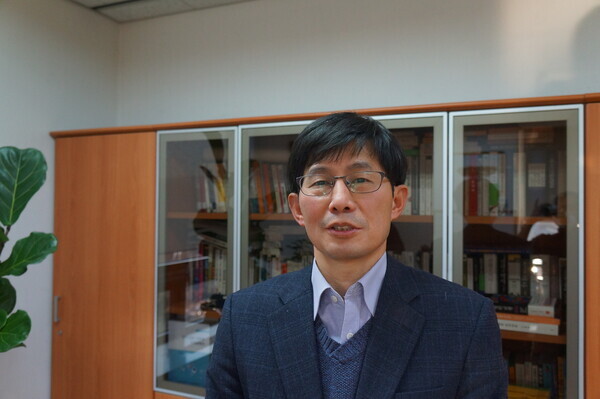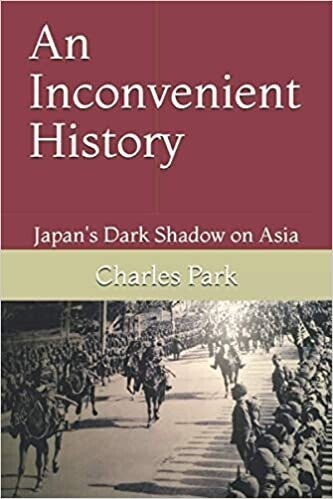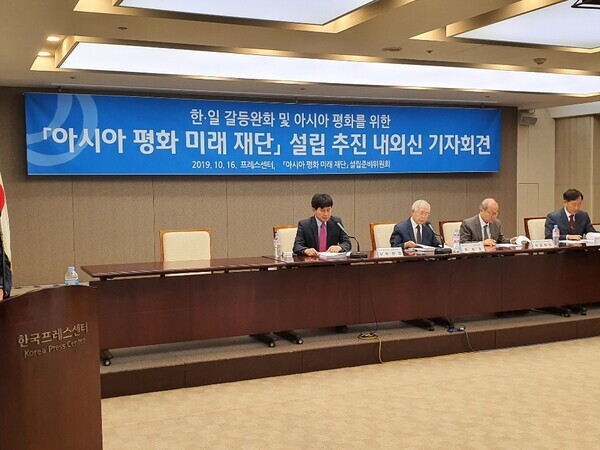hankyoreh
Links to other country sites 다른 나라 사이트 링크
[Interview] An effort to show Japan’s dark side to the world

“An Inconvenient History: Japan’s Dark Shadow on Asia” is a book that was published in English in August 2020 by Park Cheol-sun, under the pseudonym Charles Park. The book is available in both paper editions and as an e-book for Amazon’s Kindle reader.
Park is the director of the Software Testing and Certification Laboratory, under Korea’s Telecommunications Technology Association.
“It took me nearly 10 years to write this book. When I asked Amazon to publish a paper edition, they reviewed it and gave me the green light,” Park recalled.
When the Hankyoreh sat down with Park at his office near Seohyeon Station, in Seongnam, Gyeonggi Province, on Jan. 5, he explained his motivation for writing the book as follows.
“I wrote the book in English because I figured that, Japan won’t change until the international community has a clear idea of what Japan is really like. Japan has been whitewashed by most of the books written about it in other countries, such as ‘Japan as Number One,’ by former Harvard Professor Ezra Vogel.”
After passing the civil service exam in 1995, Park worked on IT policy for the South Korean government for 21 years, resigning five years ago. The institute he leads today mainly handles software testing and certification. More recently, it has also started assessing artificial intelligence (AI). The institute has 230 people on its staff, of whom 70% hold graduate degrees.

Park’s book examines how countries in Asia were harmed by modern Japan’s wars of aggression, the reasons for Japan’s territorial expansion, and the failure to hold Japan fully responsible after the war. It also suggests how Japan could thrive alongside the international community. Finally, it provides historical background that can be helpful for accurately understanding Japan and the Japanese, including the imperial system and samurai culture.
“I compiled the damage suffered by Asian countries during the Japanese Empire’s wars of aggression. I don’t remember ever seeing a book like this in English. I also analyzed Japanese culture and psychology through cultural and anthropological methods.”
While Park is also translating his book into Korean, releasing the book in Korea wasn’t a major part of his plan.
“The point is for the book to be widely read in other countries. It’s important for people in the West and other countries to respond to the book’s message, which can pressure Japan to change,” Park explained.
“The changes in Germany after its defeat in World War II were the result of pressure from Israel and from Jewish society in the US and from Germany’s neighbors, including France and the UK.”
“But Japan was different. Korea and Vietnam were divided after the war, and China couldn’t exert pressure because of its socialist system. Japan took advantage of that situation to stick close to the US and to profit thereby.”
Park had the following to say about his use of the word “inconvenient” (the Korean word can also mean “uncomfortable”) in the subtitle of his book.
“Westerners have held a positive view of Japan because it’s an advanced country, just as they are. But if they read my book, they’ll feel uncomfortable about learning that Japan has failed to reckon with its past brutality and that it has misrepresented its domination of Asia as historical glory. It would also be uncomfortable for the Japanese to confront the lesser-known dark side of their history and for Koreans to ponder the trauma of the past.”
The photo on the cover of the book shows Japanese troops’ ceremonial entrance into the Chinese city of Nanjing in December 1937. “In six weeks in Nanjing, Japanese troops killed 300,000 people. I used a photo I took at the Nanjing Massacre Memorial Hall six years ago for the cover of my book.”
Working to establish an organization for peace in AsiaFor the past two years, Park has been working to set up a private organization for peace in Asia and for mitigating the conflict between South Korea and Japan. In October 2019, he held a press conference with Son Bong-ho, professor emeritus at Seoul National University, announcing those efforts.
“I decided to set up this organization after learning that Lee Chun-sik was upset about the export controls that Japan imposed on Korea after the Supreme Court sided with Lee in a case about damages for forced labor,” Park said.
“Since there’s little chance of concessions from the South Korean or Japanese governments, I thought that ordinary people should take measures to help the victims of forced labor under the Japanese Empire. Another goal was for ordinary people in Japan and other countries in East Asia to work together for peace in Asia.”
According to Park, 120 people have said they’ll help establish the organization and 120 million won (US$110,258), including 100 million (US$91,882) out of his own pocket, has been raised thus far.

Park’s father was forcibly conscripted by the Japanese
Park’s interest in East Asian history sprang from his father’s experience with compulsory mobilization.
“In 1942, during World War II, my father was pressed into service in the South Seas Mandate and returned to Korea after Japan’s defeat in the war. At the age of 24, he was forced to leave behind a young son. He often talked about the difficulty of his life as a conscript.”
Park’s family history led him to major in history when he went to college. He entered the East Asia history department at Seoul National University in 1984. With his diploma in hand, he re-enrolled in the university, this time in the foreign affairs department.
“I was interested in East Asian relations because I thought Korea needed to find a way to survive among the four powerful countries vying for influence on the Peninsula.”
“That’s also when I got interested in Korea’s unification. On a fundamental level, the Korean Peninsula was divided because of Japan. Division was imposed on Korea, which had been a victim of the war, rather than on Japan, which had started the war.”
“I wanted to keep studying that area, but I had to give that up because of my family’s financial difficulties. Instead, I took the civil service exam. While I had to make a career in the government, I also continued researching on the side.”
Park remained a diligent student throughout his career, earning a total of eight degrees: three bachelor’s degrees, three master’s degrees, and two doctoral degrees. His degrees covered a wide range of areas: public administration and technical management (those were the doctoral degrees), as well as visual media, EU policy, international relations, and history.
What kind of reception has the book gotten in the four months since its release?
“I’ve sold several hundred copies of my book on the Amazon website. I also sent promotional copies to major media outlets in the US, the UK, Australia, and Singapore this past November, but they haven’t covered it.”
“Moving forward, I intend to start promoting my book on YouTube. I’m planning to post five or six videos about my book to YouTube by next month.”
Park offered these final reflections at the end of the interview. “The older I get, the more I remember my father. I wouldn’t be here today if not for the hardships that he endured. I feel obligated to remember people like my father. I’ve got to do something meaningful with my life.”
By Kang Sung-man, senior staff writer
Please direct comments or questions to [english@hani.co.kr]
Caption: Author and historical researcher Park Cheol-sun

Editorial・opinion
![[Column] Has Korea, too, crossed the Rubicon on China? [Column] Has Korea, too, crossed the Rubicon on China?](https://flexible.img.hani.co.kr/flexible/normal/500/300/imgdb/original/2024/0419/9317135153409185.jpg) [Column] Has Korea, too, crossed the Rubicon on China?
[Column] Has Korea, too, crossed the Rubicon on China?![[Correspondent’s column] In Japan’s alliance with US, echoes of its past alliances with UK [Correspondent’s column] In Japan’s alliance with US, echoes of its past alliances with UK](https://flexible.img.hani.co.kr/flexible/normal/500/300/imgdb/original/2024/0419/2317135166563519.jpg) [Correspondent’s column] In Japan’s alliance with US, echoes of its past alliances with UK
[Correspondent’s column] In Japan’s alliance with US, echoes of its past alliances with UK- [Editorial] Does Yoon think the Korean public is wrong?
- [Editorial] As it bolsters its alliance with US, Japan must be accountable for past
- [Guest essay] Amending the Constitution is Yoon’s key to leaving office in public’s good graces
- [Editorial] 10 years on, lessons of Sewol tragedy must never be forgotten
- [Column] A death blow to Korea’s prosecutor politics
- [Correspondent’s column] The US and the end of Japanese pacifism
- [Guest essay] How Korea turned its trainee doctors into monsters
- [Guest essay] As someone who helped forge Seoul-Moscow ties, their status today troubles me
Most viewed articles
- 1[Column] The clock is ticking for Korea’s first lady
- 2After 2 months of delayed, denied medical care, Koreans worry worst may be yet to come
- 3[Column] Has Korea, too, crossed the Rubicon on China?
- 4[Correspondent’s column] In Japan’s alliance with US, echoes of its past alliances with UK
- 5Samsung barricades office as unionized workers strike for better conditions
- 6All eyes on Xiaomi after it pulls off EV that Apple couldn’t
- 7US overtakes China as Korea’s top export market, prompting trade sanction jitters
- 8Hong Se-hwa, voice for tolerance whose memoir of exile touched a chord, dies at 76
- 9[Photo] Smile ambassador, you’re on camera
- 10[Editorial] When the choice is kids or career, Korea will never overcome birth rate woes